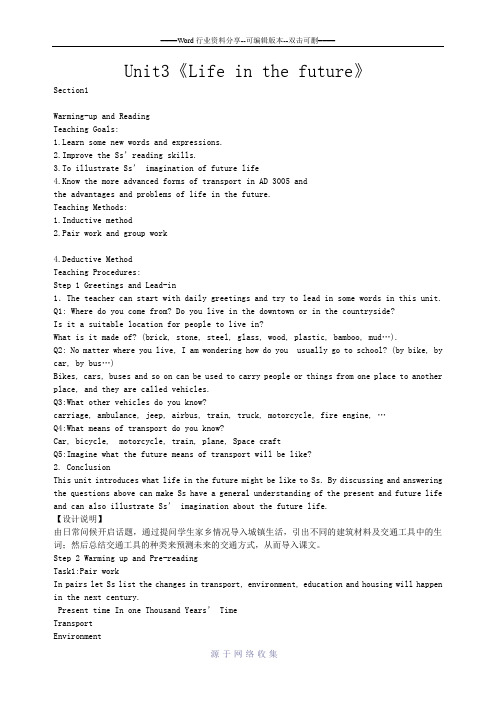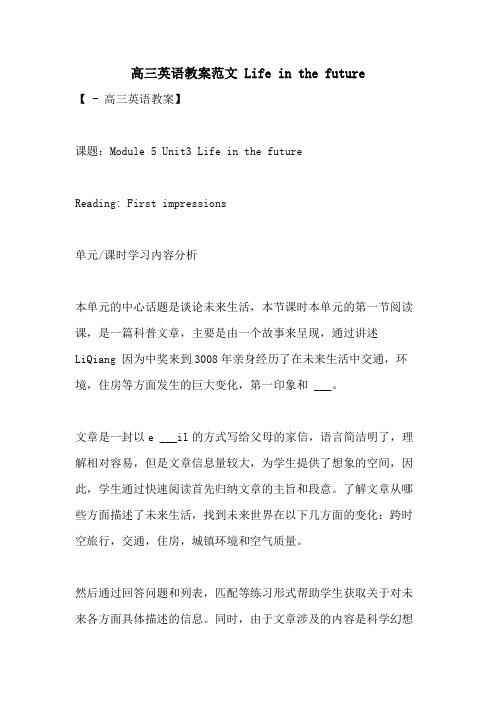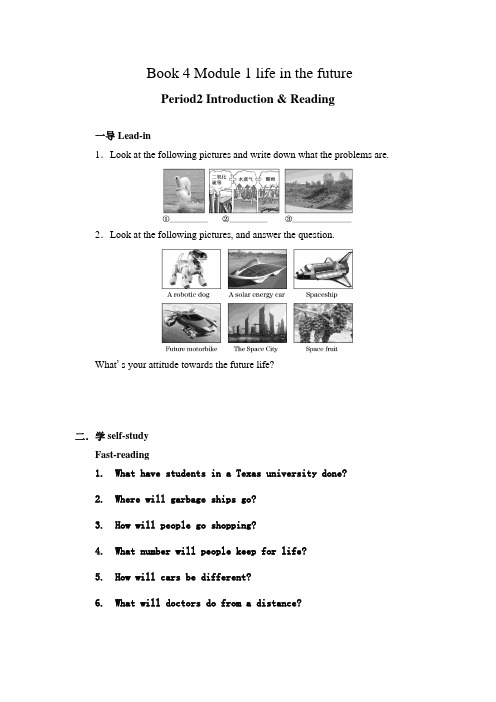Life in the future教案
初中英语_Module 4 Life in the future教学设计学情分析教材分析课后反思

M4u1 教学设计学情分析:对于遗传变异这种普遍现象,学生在生活中经常接触、感受到,通过报刊、杂志、电视、网络等媒体也接触到基因、DNA等名词术语,但要从理论上阐述、分析这些现象,牵涉到得名词术语较多,而且学生还没有相应的化学知识,对理解染色体、DNA、基因等有机大分子比较困难。
效果分析:1、本设计把语言技能听说读写作为主要目标,学生学会将来时will的用法,效果较好。
2、学生能掌握单词,学会话题联想,掌握理解文章大意的阅读策略。
教材分析:本节课是外研版初中英语新课标教材的内容,本课先联系前面知识点“be going to”将来时的用法。
引出“will”的表达法。
然后通过学生问答,自主学习,掌握这两种将来时的用法。
本节内容们对未来概念的认识表达方法,是进行探究式教学的极佳素材。
在教学中,通过发挥教师的主导作用,优化课堂结构,妙用情景模拟,把知识的传授变为让学生在探究中学习实践方法,从而渗透科学方法教育。
评测练习:※Exercises:.根据音标提示写出所缺的单词。
1. Answer my _______________ [‘kwestʃən], please.2. The old woman is _______________ ['kærɪɪŋ] a big bag to the airport.3. We will be _________ [‘eɪbl] to speak English well.4. ___________ [meɪbi] the book is hers..5. Will the city ____________ [tʃeɪndʒ] in twenty years?6. The ticket(票) is _____________ [fri:] .You needn’t pay money.7. _______________ [‘evriθɪŋ] is different in this city.8.Your ___________ [‘levl] is very high.句型转换。
高二英语必修五教案《Unit3Lifeinthefuture》

【导语】⾼⼆是承上启下的⼀年,是成绩分化的分⽔岭,成绩往往形成两极分化:⾏则扶摇直上,不⾏则每况愈下。
在这⼀年⾥学⽣必须完成学习⽅式的转变。
为了让你更好的学习⾼⼆频道为你整理了《⾼⼆英语必修五教案《Unit 3 Life in the future》》希望你喜欢! 教案【⼀】 本教学设计在新课程教学理念的指导下,⼒求在培养学⽣的语⾔知识、知识技能、情感态度、学习策略和⽂化意识等素养的基础上发展学⽣综合运⽤语⾔的能⼒,使学⽣通过观察、体验、探究等主动学习的⽅法优化英语学习⽅法,充分发挥⾃⼰的学习潜能,形成有效的学习策略。
1. 开展学⽣活动,发挥主体作⽤ 新课程强调要充分发挥学⽣在教学过程中的主体作⽤。
本课设计遵循以学⽣为主体,教师为主导这⼀教学原则,创设⾓⾊扮演情景、激烈讨论提出建议,让学⽣限度地参与教学过程,尊重学⽣的主体地位,充分发挥学⽣在学习过程中的主动性、积极性、创造性,使课堂充满活⼒。
2. 实施情景教学,统合三维⽬标 本课设计从教学需要出发,创设情景,进⾏情景设问、讨论,激起学⽣的情感体验,激活学⽣思维,帮助学⽣迅速、正确地理解和接受知识,并在学习过程中培养其积极进取的科学的⼈⽣观及价值观,较好地落实了三维⽬标。
⽽三维⽬标是相辅相成、相互渗透的,所以在情景教学的过程中,知识的落实、能⼒的培养、情感态度价值观的渗透交融在⼀起,实现了三维⽬标的和谐与统⼀。
3. 转变学习⽅式,增强教学效果 新课程要求提倡⾃主、合作、探究的学习⽅式,发挥学⽣的主体性、能动性和独⽴性,本课设计通过⾃学课本,⼩组讨论,综合分析,⾓⾊扮演等活动,为学⽣⾃主学习、合作学习、探究学习提供了空间,使学⽣体验了⾃主之乐,合作之趣,探究之悦,促进了学⽣知识的构建与运⽤,能⼒的培养和提⾼,情感体验和态度、价值观的形成,增强了教学效果。
4. 运⽤问题教学,启发学⽣思维 本课设计按照诱思探究理论要求,遵循学⽣的认知规律,引导学⽣去发现问题、分析问题和解决问题,从⽽掌握知识,形成能⼒,培养品质。
教案Unit3-life-in-the-future

Unit3《Life in the future》Section1Warming-up and ReadingTeaching Goals:1.Learn some new words and expressions.2.Improve the Ss’reading skills.3.To illustrate Ss’ imagination of future life4.Know the more advanced forms of transport in AD 3005 andthe advantages and problems of life in the future.Teaching Methods:1.Inductive method2.Pair work and group work4.Deductive MethodTeaching Procedures:Step 1 Greetings and Lead-in1.The teacher can start with daily greetings and try to lead in some words in this unit. Q1: Where do you come from? Do you live in the downtown or in the countryside?Is it a suitable location for people to live in?What is it made of? (brick, stone, steel, glass, wood, plastic, bamboo, mud…).Q2: No matter where you live, I am wondering how do you usually go to school? (by bike, by car, by bus…)Bikes, cars, buses and so on can be used to carry people or things from one place to another place, and they are called vehicles.Q3:What other vehicles do you know?carriage, ambul ance, jeep, airbus, train, truck, motorcycle, fire engine, …Q4:What means of transport do you know?Car, bicycle, motorcycle, train, plane, Space craftQ5:Imagine what the future means of transport will be like?2. ConclusionThis unit introduces what life in the future might be like to Ss. By discussing and answering the questions above can make Ss have a general understanding of the present and future life and can also illustrate Ss’ imagination about the future life.【设计说明】由日常问候开启话题,通过提问学生家乡情况导入城镇生活,引出不同的建筑材料及交通工具中的生词;然后总结交通工具的种类来预测未来的交通方式,从而导入课文。
2021年高三英语教案范文 LIFE IN THE FUTURE

高三英语教案范文 Life in the future【 - 高三英语教案】课题:Module 5 Unit3 Life in the futureReading: First impressions单元/课时学习内容分析本单元的中心话题是谈论未来生活,本节课时本单元的第一节阅读课,是一篇科普文章,主要是由一个故事来呈现,通过讲述LiQiang 因为中奖来到3008年亲身经历了在未来生活中交通,环境,住房等方面发生的巨大变化,第一印象和 ___。
文章是一封以e ___il的方式写给父母的家信,语言简洁明了,理解相对容易,但是文章信息量较大,为学生提供了想象的空间,因此,学生通过快速阅读首先归纳文章的主旨和段意。
了解文章从哪些方面描述了未来生活,找到未来世界在以下几方面的变化:跨时空旅行,交通,住房,城镇环境和空气质量。
然后通过回答问题和列表,匹配等练习形式帮助学生获取关于对未来各方面具体描述的信息。
同时,由于文章涉及的内容是科学幻想的,学生生活实践中未能尝试和经历的,因此可以借助 ___以及与文章内容相关的flas ___等资源帮助学生理解信息,使学生对未来世界有一定的感观认识。
此外,学生通过获取关于对LiQing心理的描写判断其对未来的态度,并找出支持观点的论据或例子。
培养学生推理判断的能力。
在此基础上,学生对文中描述的未来生活得出自己的结论和判断。
对人类的活动进行反思,提倡环保的生活意识,最后通过本课的学习,学生进行发挥想象,对未来的生活环境和生活方式进行猜测。
培养学生发散性思维和创新精神。
学生基本情况简介高二学生能够运用基本词汇描述用英语简单描述现在和未来的生活,表达个人情感和个人观点,学生具备基本的阅读能力,如概括文意,猜测词义,获取实事细节等。
掌握了一些简单的阅读技巧及方法,如略读,找读,跳读等。
但是学生缺乏对文字传达的信息的准确理解。
因此学生在人物对未来生活的态度进行判断时,容易形成思维定势,主观臆断。
高中英语-unit-3-Life-In-the-Future-全单元教案

⾼中英语-unit-3-Life-In-the-Future-全单元教案⾼⼆上学期第三次教案设计⼈:Unit 3 Life In the FuturePeriod 1 & 2 Warming Up & Pre-reading, ReadingTeaching Goals:1.To illustrate Ss’ imagination of future life.2.To arouse Ss to pay more attention to the problems that probably appeared in thefuture life.3.To make Ss know the difference of life between the past, present and future. Teaching Procedures:Step 1 Leading-inPurpose: To talk about past and future changes of life.1. Group workLet Ss discuss the questions in groups of four.(1)How do you usually get to school?(2)Where do you live, in a city or in the countryside?(3)Where would you like to live in the future?(4)Do you live in a flat or a house?(5)Do you have a room of you won? Can you describe the room in the picture?(6)What kind of housing would you like to have in the future?(7)What would you like to have in your room?(8)What can we use to build houses? (brick, stone , steel , glass, ice, wood , plasticbamboo, …)2. ConclusionThis unit introduces what life in the future might be like to Ss. By discussing and answering the questions above can make Ss have a general understanding of the present and future life and can also illustrate Ss’ imagination about the future life. Step 2. Warming Up1. Pair workIn pairs let Ss list the changes in housing, transport, jobs, families and education will happen in the next century.2. Individual workAccording to the result of the above Pair work, fill in the chart.Step 3. Pre-reading1. Pair workAsk Ss to discuss the following questions in pairs.(1)Make a list of the problems human beings are facing today.(2) What problems do you think people will have overcome in one thousand years? Which ones do you think will still exist inAD 3008?Suggested Answers:①The first problem I would like to point out is the decline of morality.(道德沦丧)②The second problem is the racial bias problem. (种族歧视)③The third problem , which is a most serious problem , is the rapid depletion of resources on the Earth. (资源匮乏)④Now I come to the fourth problem, the problem of the large gap between the poor and the rich . (贫富悬殊)⑤The fifth problem is the pollution problem.(环境恶化)⑥Now I would like to talk about the sixth problem, the expensive arms race problem. (军备竞争)。
2019-2020年七年级英语下册 Module 4 Life in the future全模块教案 外研版

2019-2020年七年级英语下册 Module 4 Life in the future全模块教案外研版一、教学内容分析本模块以未来的教室及学习为切入点,谈论将来我们生活的各个方面,学生较为有兴趣,便于展开活动。
Unit1的主要内容是涉及一些有关于教室和科学方面的名词,一篇出现了将来时的听力、一段有关未来教室的对话以及相关的几个训练活动,在这个过程中学习和掌握一般将来时WILL+动词原形的陈述,一般疑问句及问答,及否定句。
二、学生情况分析本模块以学生心目中的未来教室为话题,这与学生的现实生活密切相关,他们有话可说,乐于参与课堂活动,而涉及的语法项目是一般将来时will 的陈述句,否定句,一般疑问句及回答,动词不用任何的变化,学生应该较为容易掌握。
三、教学目标1.能够正确理解有关未来学校的对话。
2.能够听懂有关未来生活的简单对话。
3.能够用一般疑问句正确问答有关将来的信息。
四、教学重点和难点1.词汇的正确运用。
2.一般将来时will 的陈述句,否定句,一般疑问句及回答五、教学策略任务型教学、自主学习、合作学习六、教学手段磁带,图片七、教学过程Step 1 . Everyday EnglishWhat day is it today?What do you do today?What are you going to do tomorrow?……Step2.Warm-upT: What will you do at this weekend?S: I will do my homework at this weekend..T: Will you play the piano this afternoon?S: Yes, I will /No, I will not.………Like this, ask the students to work in pairs to review the future tense.Step2. PresentationT: What will you do at this weekend?Help the students answer: I will play games at this weekend.(用be going to+do引出will+do,使同学们在很自然的复习语境中导入到新课)Ask the students to work in pairs to practice will+do.Step3.Vocabulary(1) Use the pictures to teach the new words :cable, , cell phone, , paper, ruler, satellite TV.(2)guessing games :What do you use to learn math and science ? calculatorWhat do I use to teach English? chalk(3)Let students repeat the words loudly.(创设情景教单词,使学生自然地掌握了单词的读音和用法。
高中英语Module 1 Life in the Future (2)教案

Book 4 Module 1 life in the futurePeriod2 Introduction & Reading一导Lead-in1.Look at the following pictures and write down what the problems are.2.Look at the following pictures, and answer the question.What's your attitude towards the future life?_________________________________________________________________ _________________________________________________________________ _________________________________________________________________ 二.学self-studyFast-reading1. What have students in a Texas university done?2. Where will garbage ships go?3. How will people go shopping?4. What number will people keep for life?5. How will cars be different?6. What will doctors do from a distance?三、展Check the students’ answers and show them correct answers.四、练Practicecareful-readingRead the text carefully and choose the best answers.1.Why will care for the environment become very important in the future?A.Because earth's natural resources run out.B.Because we will use lots of recycled materials, such as plastic, aluminum, steel, glass, wood and paper.C.Because we will waste fewer natural resources.D.Because we will also have to rely more on alternative energy.2.What does the word “landfill〞mean in the text?A.An area of land where large amounts of waste materials are buried under the earth.B.The process of burying large amounts of waste materials.C.Waste materials that will be buried.D.A piece of land in the valley.3.What is not mentioned as an idea for running the future city?A.Holidays at home.B.Telesurgery.C.Attending school at home. D.Recreation.4.Which of the statements is NOT true according to the text?A.No one is allowed to smoke in the city.B.All shopping will be done through computers.C.Common people can travel in space.D.Children can't have phones and phone numbers.五、结(summary)___________________________________________________________ _____________________________________________________________________ _____________________________________________________________________。
2020版高考英语 第1部分 Unit 3 Life in the future教学案(含解析)5

Unit 3 Life in the future[单词拼写应用]核心单词1.previous adj。
在前的;早先的2.fasten vt.系牢;扎牢3.desert n.沙漠;荒原4.flash vt。
& vi.(使)闪光;(使)闪现5.guide n.指导;向导;导游vt.指引;指导6.lack vi.&vt。
缺乏;没有n.缺乏;短缺的东西7.switch n.开关;转换vt。
转换8.optimistic adj。
乐观(主义)的9.material n.原料;材料10.recycle vt。
回收利用;再利用11.dustbin n.垃圾箱12.button n.纽扣;按钮[语境运用]用所给词的适当形式填空.1.A new series of simple English reading materials (material) formiddle school students has come out this year。
2.With the man guiding(guide) us ahead,we had no trouble finding the village.3.According to the airline rules,we suggest you (should)_switch (switch)off your mobile phone before boarding。
4.All passengers on board are expected to_fasten(fasten) the seat belts when the plane takes off and lands.5.Paper,iron and glass are all materials which can be_recycled(recycle) and reused again.拓展单词1.tolerate vt.容忍;忍受→tolerance n.容忍2.impress v.(使)留下深刻印象→impression n.印象;感想;印记→impressive adj.给人深刻印象的3.constant adj.时常发生的;连续不断的→constantly adv。
- 1、下载文档前请自行甄别文档内容的完整性,平台不提供额外的编辑、内容补充、找答案等附加服务。
- 2、"仅部分预览"的文档,不可在线预览部分如存在完整性等问题,可反馈申请退款(可完整预览的文档不适用该条件!)。
- 3、如文档侵犯您的权益,请联系客服反馈,我们会尽快为您处理(人工客服工作时间:9:00-18:30)。
Step 2 reading(activities2,3,4,5,6,7)
1 Read the passage and match the pictures in activity1 with the paragraphs.(activity2)
授课时间
第周星期年月日
总第课时
课题
Unit 1 Everyone will study at home.
课型听说课
课时
教学目标
To understand conversations about future life
To talk about school life in the future
重点
Will do的应用
目的:反义词活动
操作:将学生分为两组,甲组将第一行单词扩充为短语,乙组用第二行的单词进行替换。Easy jobs____difficult jobs
6 Word in pairs.Talk about life in the future(Activity7)
目的:训练学生的交际策略
操作:两人小组中的一方要说出未来生活的一种变化,另一方用yes或no来回答,并且用but补充说明自己的观点。
Will students...?
Yes,they will./No,they won’t.
How will students...
Step1 warming_up/lead_in(activities1,2)
目的:解决听力活动中的语言障碍,为听力对话做语言上的铺垫和准备;通过讨论图片内容来激活学生的背景知识,从而更好地理解听力对话。
难点
Will do的句型转换
教
学
过
程
教学内容
个人备课
Key vocabulary:ruler carry everything future in the future life need will maybe ask question by able be able to
Key structures:Everyone will...
目的:信息辨别,有助于对课文内容理解
操作:个体活动,两人讨论
4 complete the passage with correct form of the words from the box.(Activity5)
目的:强化核心词汇
操作:教师领读词汇,学生独自补全短文,核对答案
5 Match the words with their opposites(Activity6)
目的:信息辨认,段落与图片进行匹配
操作:个体活动,学生独自阅读
两人一组。核对答案
教师点名提问,全班核对答案
老师放录音,学生跟读
2 Match the paragraphs with the headings(activity3)
目的:信息概括,培养学生总结和理解大意的能力
操作:个体活动,全班核对
3 Check the true sentences(activity4)
Step2 listening(activity3,4)
1 listen and read
目的:训练学生的细节辨认能力,老师要带领学生进行口头输出活动,让学生分别介绍一下大名和贝蒂的想法。
操作:教师领学生快速浏览表格,引导学生预测听力内容的重点
播放录音,学生独立完成
再播放一遍录音,学生独自检查答案,然后同伴核对
播放录音,学生跟读并模仿语音、语调
小组分角色熟读课文,尝试小组表演对话
2 complete the passage with the correct form of the words and expressions from the box.(activity)
目的:词汇练习,运用所学词汇
操作:个体活动,学生独自补全对话
教师点名检查,全班核对答案
教
学
反
思
英语备课
七
年
级
教师
小组活动,两人一组互相检查
Step3 Pronunciation and speaking(activities5,6)
1 Listen and mark the stress.
目的:学习单词重音
操作:个体活动,听录音标注单词重音
全班核对答案
老师播放录音,全班跟读
2 listen and repeat(activiry6)
小组活动,两人一组互相检查
教师提名提问
学生试着用这些词汇描述自己的教室,鼓励学生主动尝试
2 listen and choose Lingling’s answers to the questions.(a2)
本活动是听力活动,用will+动词原型谈论未来的生活。
教师播放录音,学生独自完成,老师对答案,适当地总结will的一般一般疑问句及其肯定、否定回答。
课型
课时
教学目标
To get information from the reading material about life in the future
重点
Key vocabulary
难点
Key structures
教
学
过
程
教学内容
个人备课
Step 1 warming_up(activity1)
目的:为下一步阅读做准备
目的:口头输出活动,培养运用will的能力
操作:四人一组讨论,汇报讨论结果
个体活动:学生各自画出自己想象中的十年以后的样子
全班活动,评选出最富想象力,最漂亮的,表达最清楚的个人或小组
教
学
反
思
授课时间
第周星期年月日
总第课时
课题
Unit2 Every family will have a small plane.
1 work in pairs.look at the picture and describe e the words in the box to help you .(activity1)
目的:建立意义与所指之间的联系,属于信息辨认活动,为输出活动做准备。
操作:个体活动,学生独自描述图片
目的:学习元音字母u在单词中的基本读音
操作:学生跟读录音,注意发音正确
3 work in pairs.(activity7)
目的:复习will的用法
操作:两人一组活动,一问一答
4 work in pairs.talk about r school will be like in in years.(activity8)
两人一组,一问一答,且相互交换角色
Step3 Writing(Activity8)Look at the sentences.Now complete the sentences with so(Activity8)
目的:让学生掌握so的用法
操作:教师带领学生阅读范例,明白so表达的逻辑关系
学生独自完成,同伴校对
